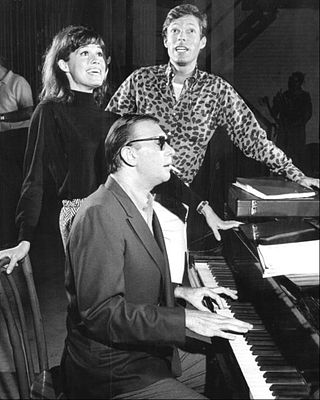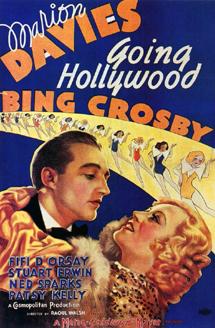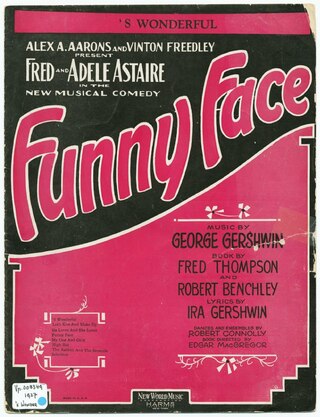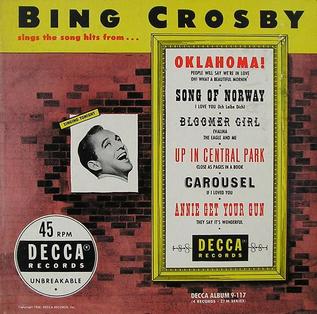Related Research Articles

Henry Robert Merrill Levan was an American songwriter, theatrical composer, lyricist, and screenwriter. Merrill was one of the most successful songwriters of the 1950s on the US and UK single charts. His musicals for the Broadway stage include Carnival! and Funny Girl (lyrics).

"Carolina in the Morning" is a popular song with words by Gus Kahn and music by Walter Donaldson, first published in 1922 by Jerome H. Remick & Co.

"Let's Do It, Let's Fall in Love" is a popular song written in 1928 by Cole Porter. It was introduced in Porter's first Broadway success, the musical Paris (1928) by French chanteuse Irène Bordoni, for whom Porter had written the musical as a starring vehicle.

"True Love" is a popular song written by American songwriter Cole Porter, published in 1956. The song was introduced by Bing Crosby and Grace Kelly in the musical film High Society. "True Love" was nominated for the Academy Award for Best Original Song. Kelly's contribution on the record is relatively minor, duetting with Crosby on only the final chorus. Nonetheless, the single is co-credited to her.
"Lullaby of Broadway" is a popular song with music written by Harry Warren and lyrics by Al Dubin, published in 1935. The lyrics salute the nightlife of Broadway and its denizens, who "don't sleep tight until the dawn."
"Oh, What a Beautiful Mornin'" is the opening song from the musical Oklahoma!, which premiered on Broadway in 1943. It was written by composer Richard Rodgers and lyricist/librettist Oscar Hammerstein II. The leading male character in Oklahoma!, Curly McLain, sings the song at the beginning of the first scene of the musical. The refrain runs: "Oh, what a beautiful mornin'! / Oh, what a beautiful day! / I've got a beautiful feelin' / Ev'rythin's goin' my way." Curly's "brimming optimism is perfectly captured by Rodgers' ebullient music and Hammerstein's buoyant pastoral lyrics."

Carnival is a musical, originally produced by David Merrick on Broadway in 1961, with the book by Michael Stewart and music and lyrics by Bob Merrill. The musical is based on the 1953 film Lili, which again was based on the short story and treatment titled "The Seven Souls of Clement O'Reilly" by Paul Gallico. The show's title originally used an exclamation point ; it was eventually dropped during the show's run, as director Gower Champion felt it gave the wrong impression, saying, "It's not a blockbuster. It's a gentle show."
"My Baby Just Cares for Me" is a jazz standard written by Walter Donaldson with lyrics by Gus Kahn. Written for the film version of the musical comedy Whoopee! (1930), the song became a signature tune for Eddie Cantor who sang it in the movie. A stylized version of the song by American singer and songwriter Nina Simone, recorded in 1957, was a top 10 hit in the United Kingdom after it was used in a 1987 perfume commercial and resulted in a renaissance for Simone.
"If I Were a Bell" is a song composed by Frank Loesser for his 1950 musical Guys and Dolls.

Going Hollywood is a 1933 American pre-Code musical film directed by Raoul Walsh and starring Marion Davies and Bing Crosby. It was written by Donald Ogden Stewart and based on a story by Frances Marion. Going Hollywood was released by Metro-Goldwyn-Mayer on December 22, 1933.
"I Love Paris" is a popular song written by Cole Porter and published in 1953. The song was introduced by Lilo in the role of La Mome in the musical Can-Can. A line in the song's lyrics inspired the title of the 1964 movie Paris When It Sizzles.

"'S Wonderful" is a 1927 popular song composed by George Gershwin, with lyrics written by Ira Gershwin. It was introduced in the Broadway musical Funny Face (1927) by Adele Astaire and Allen Kearns.
"I've Got a Crush on You" is a song composed by George Gershwin, with lyrics by Ira Gershwin. It is unique among Gershwin compositions in that it was used for two different Broadway productions: Treasure Girl (1928), when it was introduced by Clifton Webb and Mary Hay, and Strike Up the Band (1930), when it was sung by Doris Carson and Gordon Smith. It was later included in the tribute musical Nice Work If You Can Get It (2012), in which it was sung by Jennifer Laura Thompson. When covered by Frank Sinatra he was a part of Columbia Records.
"You Took Advantage of Me" is a 1928 popular song composed by Richard Rodgers, with lyrics by Lorenz Hart, for the musical Present Arms (1928), where it was introduced by Joyce Barbour and Busby Berkeley as the characters Edna Stevens and Douglas Atwell. The characters were formerly married, but still have romantic feelings for each other. On opening night, Berkeley forgot the lyrics and had to scat and hum the entire second verse. Berkeley also claimed that his nonsense lyrics for the improvised second verse left Hart "almost apoplectic", but the audience was amused and Hart later forgave him. The song was subsequently included in the 1930 film Leathernecking, an adaptation of Present Arms.
"(You'd Be So) Easy to Love" is a popular song written by Cole Porter for William Gaxton to sing in the 1934 Broadway show Anything Goes. However Gaxton was unhappy about its wide vocal range and it was cut from the musical. Porter re-wrote it for the 1936 film Born to Dance, where it was introduced by Eleanor Powell, James Stewart, and Frances Langford under its alternate title, "Easy to Love". The song was later added to the 1987 and 2011 revivals of Anything Goes under the complete title "You’d Be So Easy to Love".
"I Guess I'll Have to Change My Plan" is a popular song published in 1929, with music by Arthur Schwartz and lyrics by Howard Dietz.
"Make Believe" is a show tune from the 1927 Broadway musical Show Boat with music by Jerome Kern and lyrics by Oscar Hammerstein II.
"Younger than Springtime" is a show tune from the 1949 Rodgers and Hammerstein musical South Pacific. It has been widely recorded as a jazz standard.

Romantically is an album by American pop singer Johnny Mathis that was released on November 18, 1963, by Columbia Records and was also the final original studio album recorded by Mathis for the label prior to his moving to Mercury Records. Mathis had recorded exclusively for Columbia from 1956 to 1963. After a brief stint with Mercury, he returned to Columbia in 1967. His first Mercury project, Sounds of Christmas, was actually released six weeks before this one, on October 4.

Bing Crosby Sings the Song Hits from Broadway Shows is a Decca Records compilation 78rpm album of phonograph records by Bing Crosby featuring some of the hits from Broadway musicals.
References
- ↑ Howard Kissel David Merrick: The Abominable Showman Applause Books NYC (1993) p. 208
- ↑ "www.allmusic.com". allmusic.com. Retrieved December 28, 2021.